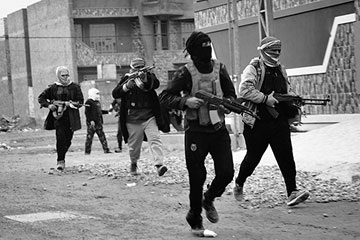
Tribal fighters patrol Fallujah streets on Jan. 5 as the Iraqi government faces off against al-Qaeda forces.
(5 of 6)
Yet Baghdadi may have overreached. Even as ISIS regains territory in Iraq, it is slowly being pushed out of its northern Syrian stronghold by a broad coalition of moderate and Islamist groups--including members of al-Nusra--who are fed up with its draconian interpretations of Islamic law and its abuses of power. After ISIS's abduction, torture and killing of a popular doctor who commanded a rival militia, on Jan. 1 near Aleppo, days of fierce infighting between insurgent factions led to an anti-Baghdadi victory of sorts. By Jan. 6, ISIS had been largely forced from its Raqqa stronghold. Terrorism analysts suspect it may be a tactical withdrawal on Baghdadi's part as he calls in reinforcements from Iraq and western Syria. Losing Raqqa at this point could be perceived as an ideological blow to a leader who says he has a divine mandate to rule over a new Islamic emirate, but the militia remains powerful and dangerous. "Even though ISIS has suffered territorial losses in the past few days, it hasn't lost the capacity to inflict damage on any target they please," says Charles Lister, a visiting fellow at the Brookings Doha Center in Qatar. ISIS launched one suicide car-bomb attack in the contested town of Darkoush, Syria, on Jan. 6, killing at least 17 fighters from a rival brigade, and ISIS commanders in Aleppo were accused of killing some 50 detainees on the same day--many of them political activists, fighters, citizen journalists and relief workers--according to a statement from the Syrian opposition coalition, which represents Syria's political opposition as well as the Syrian revolutionaries' front.
A similar backlash against Baghdadi appears to be under way in Iraq. Security forces there have announced preparations to retake Fallujah, and some Sunni tribes, aggrieved by the Shi'ite-dominated government's neglect, are slowly coming to the conclusion that Baghdadi, even if he does share their faith, may yet present the greater evil.
Worries in Washington
That may be good news in the short term for the U.S.--Baghdadi is much too occupied with his local ambitions and the troubles they have made for him to turn his attention to the West. But the resistance to Baghdadi may prove fragile in the face of his brutality and his skill, and some in the U.S. worry about him as a threat in the future. U.S. Congressman Mike Rogers, chairman of the House Intelligence Committee, says al-Qaeda's affiliates in Syria are debating when to launch an attack on the West. "They're talking about conducting external operations," Rogers warned in an address to policymakers at the 2013 Foreign Policy Initiative Forum in Washington in October. "The only thing we think is stopping it now is the fact that there is this struggle between al-Qaeda core leadership saying, 'Hold off, don't do it yet.'" Baghdadi's international reputation has drawn recruits from the U.S. and Europe, sparking fears that they may return home radicalized and well trained. U.S. National Counterterrorism Center director Matthew G. Olsen told the Senate Homeland Security Committee on Nov. 14 that ISIS's "growing cadre of Western recruits probably bolsters the group's pool of external operatives who could be used to target the West."
